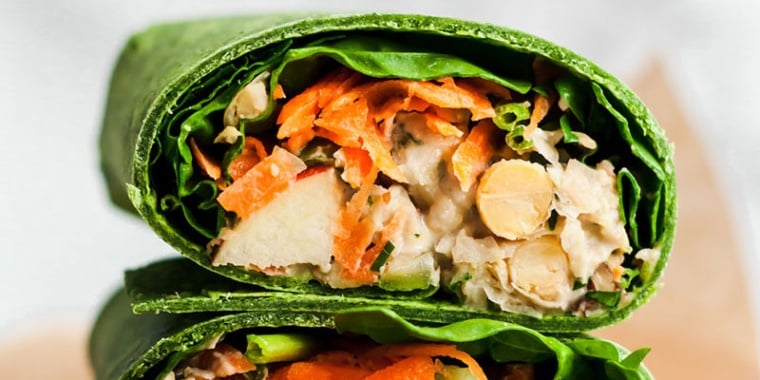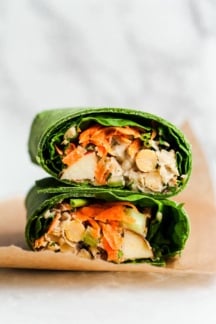I first wrote this blog post when I was 23 years old. Here’s what it said:
“It’s coming to a point on my Facebook where everyone is becoming engaged. I don’t know what’s happening?
I mean, any time I even think about having a boyfriend I can’t help but laugh; all of the guys I go on dates with are either A) committed to work, B) completely awkward, or C) have questionable intentions. But I guess that’s what happens when you are 23.
So for now I think I’ll stick to single lady things until the man of my dreams (who might resemble Joshua Jackson aka Pacey from Dawson’s Creek) comes into my life. Plus if I had a boyfriend I probably couldn’t get away with making him eat quinoa and kale instead of manly beer battered onion rings and cups of BBQ sauce… or whatever Burger King is advertising this week.
What are your thoughts on that?
Blink.
Hmmm, got it.
Let’s move on and discuss adult things. Like salads.”
Looking for more 30-minute meals?
Enter your email below to get my FREE e-book with our best 30-minute dinners straight to your inbox!
Reading it made me laugh real hard. Life’s got a funny way of changing quickly. Tony (my husband) and I met when I was 24 (only a year later). He still eats onion rings and pretty much hates all things quinoa (except when I make these truffles) and we now have 3 little boys.
Let’s talk about this ridiculously good kale quinoa salad. It’s basically the perfect salad for spring & summer party season people. My love of kale salads first began in 2010 when I would always find my mom making a big batch of raw kale salad with lemon, olive oil, garlic, and all the bell peppers. She would let it still a few hours until the lemon juice broke down the kale and the flavors became melded together; it was sensational.

Ingredients in this kale quinoa salad
This salad is like a healthy little fairy tale I dreamt up. The happy ever after is that flavor explosion in your mouth with juicy mangoes, crisp veggies, nutty quinoa, and more. Here’s everything you’ll need to make it:
- Quinoa: is there anything better than quinoa in salads? I think not. It gives this salad a wonderful texture and a boost of protein.
- Edamame: for another source of plant-based protein we’re adding some delicious edamame.
- Kale: the base of this salad is gorgeous kale! See below for tips for adding it to salads.
- Fruits & veggies: we’re rounding out this salad with grape tomatoes, red onion, mango, and creamy avocado. SO much flavor and goodness.
- For the dressing: I tossed this salad in a little lemony basil vinaigrette which takes about 5 seconds to mix together with fresh lemon juice, olive oil, garlic, dijon mustard, honey, fresh basil, salt & pepper. You can put it in a blender, or mix it up in a bowl (just make sure to mince the basil first).
- To garnish: I love topping this salad with toasted sliced almonds for extra crunch.

Customize your salad
The flavors and textures in this kale quinoa salad are absolutely perfect together, but there are some great ways you can make it your own, too:
- Pick your produce: I think pineapple and red bell pepper would be great swaps for the mango and tomatoes if that’s what you have on hand.
- Swap the nuts: pistachios would also be delicious in this salad in place of the almonds.
- Try a new protein: don’t have any edamame? Add a can of rinsed, drained chickpeas instead!
- Choose a new grain: you could easily swap the quinoa for pearl couscous as well. LOVE.
Looking for another boost of protein?
If you’re not vegetarian or vegan, try one adding chopped chicken breast (my baked or grilled honey mustard chicken would be perfect), shrimp or salmon (my Honey Lemon Garlic Salmon would be delicious).

Tips for making salads with kale
If you’re wondering what the trick to a really good kale salad is, it’s simple: massage in the dressing with your hands! Sounds crazy, but the dressing actually helps to break down the bitterness of the kale and infuse it with flavor. Here are some extra tips:
- Be sure to chop it very finely so that the bites aren’t too large.
- Add the dressing to the kale by itself first and toss it all together really well. You can even do this with your hands and “massage” the dressing in so that all of the kale is well coated.
- Let it marinate! That’s right, you’ll want to let the dressed kale sit for at least 15 minutes before adding the other toppings so that it soaks up all of the flavor. It makes all the difference.

Storing tips
This easy kale quinoa salad will keep well for about 3-4 days in an airtight glass container in the refrigerator.
More salad recipes you’ll love
- Famous Crunchy Cashew Thai Quinoa Salad {vegan & gluten-free}
- California Roasted Sweet Potato Kale Salad
- One Pot Moroccan Chickpea Quinoa Salad
- Sesame Chicken Cabbage Crunch Salad
- Roasted Veggie, Chickpea & Pesto Quinoa Salad
Get all of my salad recipes here!
I hope you love this kale, edamame quinoa salad recipe! If you make it be sure to leave a comment and a rating so I know how you liked it. Enjoy, xo!

Ambitious Kitchen
Cookbook
125 Ridiculously Good For You, Sometimes Indulgent, and Absolutely Never Boring Recipes for Every Meal of the Day

Ingredients
- ¾ cup uncooked quinoa
- 1 ½ cups water
- 1 ½ cup frozen edamame, thawed
- 1 bunch kale, stems removed and very finely diced
- 1 cup sliced grape tomatoes
- ⅓ cup diced red onion
- 1 large mango, pitted and diced
- 1 avocado, sliced
- For lemon basil vinaigrette:
- ¼ cup freshly squeezed lemon juice
- ¼ cup olive oil
- 1 garlic clove, minced
- 1 teaspoon dijon mustard
- 1 teaspoon honey (or agave nectar)
- 4-6 large basil leaves, very finely diced
- Freshly ground salt and black pepper, to taste
- To garnish:
- ¼ cup toasted sliced almonds
Instructions
- First, cook your quinoa: Add quinoa and water to a medium pot and place over high heat; bring to a boil, then cover, reduce heat to low and cook for 15 minutes. After 15 minutes, remove from heat, fluff quinoa with a fork and transfer quinoa to a large bowl to cool down.
- To make dressing: place olive oil, lemon juice, garlic, dijon, honey (or agave), basil, and salt and pepper in blender. Pulse for 10-15 seconds; set aside. You can also whisk in a small bowl if you don't have a blender (just make sure your basil is very finely chopped.)
- In large bowl add your kale and pour half of the dressing over. Use clean hands to massage the kale for about 3 minutes or until it breaks down. This allows the kale to take on the dressing flavors.
- Next add in quinoa, edamame, diced onion, and remaining lemon vinaigrette; toss so that the salad is fully coated.
- Before serving, toss salad again and add tomatoes, mango and avocado. Sprinkle toasted sliced almonds over the top. Serves 4. Great for meal prep, picnics or parties!
Recipe Notes
Nutrition
This post was originally published on May 17th, 2018, and republished on July 9th, 2024.













127 comments
Wow, I came here from Foodgawker and while I generally read posts… I couldn’t take my eyes off of your photography. So beautiful!
WHEN IS THE DIJON USED IN THE LEMON VINAIGRETTE? NOT LISTED??
Thanks for the catch! I’ve updated the instructions – just add the dijon with the rest of the vinaigrette ingredients.
Oh no! Certainy you would reign in a guy with fantastic taste in food. Maybe you’ll get as lucky as I did, and find yourself a man whose idea of a great weekend is apple picking, pie baking, cider making, and spinach couscous with oranges and olives for dinner.
The point is… not all dudes want Burger King or BBQ. Beer, maybe. But that’s a different story.
I agree. You can reign in a man on good food. But it seems that some guys think if it’s healthy it’s girly and not manly. Men are notorious for being lovers of meat and potatoes. Quinoa? Couscous? Some men will go so far as to say these types of foods are GAY! I hate that. Toss them a prime rib and baked potato dinner and eat healthy with the girls.
This looks incredible!! Definitely not man food, but
whoops hit submit on accident! aaaanyways….can’t wait to make this!
This salad looks super fresh and totally delicious. I love the colors as well — if it’s pretty enough to eat, well…!
Oh I feel you on the man-food vs our-food debate.. As an perpetually single girl with a recent man added to her life, I can tell you it’s going to be a hard transition. Him.. not me. I refuse to stop making kale salads!
If you’re lucky you might find an already-trained man. I suggest hanging out at yoga studios and farmer’s markets 😉
Anyways this looks like a beautiful dish.. simple, healthy and nourishing. Love the addition of mango.. I will be making a big batch this weekend!
This looks sooooo good…the avocado slice on top was my drool-point…
If you’re wondering if I’m stalking your blog, the answer is “yes.” 🙂 I made this salad last night for dinner and it was great! I almost didn’t add the mango but I’m so glad I did, it really added some nice sweetness to it. I found myself digging for more of the juicy pieces. And then I made the banana pancakes this morning and they were great too. Thanks for getting my out of my recipe rut! Your blog is great!
Oh, and I married a meat-n-potatoes kind of guy…and slowy but surely he’s coming around on the healthy stuff. In fact quinoa is one of his favorite foods now. So it IS possible. Even if it seems impossible at first. hahaha
Thank you for visiting. I’m happy you loved the salad; it’s my go to detox because it’s completely vegan and yet it fills you up!
I would so love that Lemon Vinaigrette!
This is fantastic! Thanks for such a healthy meal. Way too easy to make the sweet stuff! No decently ripe mangoes so I subbed mandarin oranges . Mmmmm……good substitute for color and sweetness of mangoes!
I didn’t have mangos but dried cranberries are delicious in this salad!!
I am so making this over the holidays. FANTASTIC RECIPE
Sarah Martorella Justine Iskandar.
Umm u Sure Are salad pro lady!! Haha :p
A clean start to the new year, with banana/pineapple (only) ice cream for dessert.
Cannot wait to make this as part of my meal plan for a cleanse from processed food!
This looks sensational, can't wait to try it!
Your poop is gonna awesome.
This looks right up my alley as far as my pallet goes and amazing nutrition is the STAR of the Day!
One of the best salads I’ve made – it was very fresh tasting. My husband loved it too.
Hi Nancy! I’m glad you enjoyed it!
I have made this twice in one week – my family loves this salad! Thanks for sharing such a great and healthy recipe.
Thought this sounded & looks delish Amy Cobb McGinnis : ).
thanks Sis:) Does look good! Cheers
This was ABSOLUTELY DELICIOUS!!! Becoming one of my regulars!!!
Is the sugar in the dressing absolutely necessary? Is there something else that could be substituted for it (other than artificial sweeteners). I know it’s only 1 teaspoon, but I try to avoid all refined sugar and artificial sweeteners.
Try honey, or just simply omit it. The salad is perfect either way.
Made it today, and it was delicious! Thanks for the recipe!!
This salad was so good! I cooked the quinoa with chicken broth and added some chicken to the salad. Sorry, I'm not vegetarian!
Made this last night & had to sub the kale with spinach & the edamame with Lima beans & guess what! It was super yummy!
Yum!!! Can i come for Dinner????
Sure what time?
Lori, how did the spinach go? I'm going to make it tomorrow with some spinach I've got to use up!
Ah ah I loved the part about having to make manly Burger King-advertised food for your boyfriend :))
Good thing with my boyfriend is that being a chef, he also loves good healthy food. And the occasional 400 g of beef with potatoes. Ugh.
Love your salad btw, great ingredients, healthy and colorful : yum ! (gone to buy ingredients)
This was very tasty. Thanks so much for sharing. I will definitely leave myself more time to prep next time. 😉
Filling good.
Making it for the second time in 3 days! So yummy & healthy!
Any idea on the Weight Watcher points?
I just can't eat mangos. Any ideas for a replacement. I can't wait to try this.
I think any sweet tropical fruit would work well!
Try some fresh pineapple
Peaches, nectarines, tangerines, apples, strawberries.
I am so glad to have found your blog, I love all of your posts! A little advice, whatever you do, do not settle on a man. I was in my 30’s when I found my athletic, clean-eating gem and I am glad I never settled. You want them to live as long as you will (if you like them). 😉
🙂
Made this, and the grownups in our house loved it. Thank you!
love it all except for the edamame…soy is anything but healthy for you…do some research. other than that, really enjoy many of your other recipes as well. and good luck with the 'guy' thing.
Pure perfection! Love the salad and beautiful pictures. I have blog-envy! 😉 Btw, I, too, love kale and quinoa. My latest recipe is a salad with quinoa and my first time to make a salad with quionoa! Lastly, boys that only like burger king-type food…yuck! Stay true to yourself and you can’t go wrong!! {and healthier, clearly!}
Monique, I just discovered your wonderful site! This kale, edamame, and quinoa salad looks great, and I plan to make it soon. Do you have a nutritional breakdown for it?
Thank you for this delicious recipe! I was able to use the first veggies from my garden in it (kale and basil) and while I made a few adjustments (basically I threw in what veg I had in the fridge) I made your vinaigrette to the letter and it’s AMAZING. Can’t wait to keep making this salad all summer!
This salad sounds absolutely awesome! I would have to skip the onion and my husband would skip the avocado (crazy man doesn’t like them), but this is something I would like to try. It’s just an intriguing combination of ingredients. Thank you for posting this.
Looks fantastic!
This salad is mental and even better the next day as leftovers! Monique you rock!
This looks great and I want to try it but not really fan of mangos….. Any substitution suggestions? Or just leave it out?
Kale from a farmers market and Niagara peaches (substituted for mango) made this salad a hit. Leftovers great for lunch. Ahh, summer!
I've also made Monique's egg, avocado, bacon, jack sandwich and the chicken, chick pea chopped salad – all delish!
Great recipe! I added some diced serrano pepper for an extra kick. Also I usually add ghee + sea salt to boil with the quinoa. The mango was a delicious treat.
Ha don’t discredit all of us men so fast! Yes, the beer battered fried onions might be a bit hard to pass up.. However this is a great snack for even the manliest of manly men, especially after a day out in the mountains! Deliciously refreshing.
Love! Love! Love! Seriously best salad ever! When I told my boyfriend I was making a quinoa salad for dinner his response was “Can I just have some potatoes?” I’m vegan and he’s not so we frequently eat different foods. But when I served dinner he tried my salad and changed his mind, the salad was so amazing! Thanks!!
This recipe is da bomba!!!!! Just made this and what a winner!! Going in the repertoire for sure, thanks for posting this awesome dish 🙂
I had to substitute the mango with papaya and this was an amazing salad!
I’m actually really torn on this recipe… while it was good, I didn’t think it was anything special, neither did my husband, which is so surprising because I love your recipes! And actually, my nutrition info is way WAY different than yours. Maybe you meant ‘quinoa cooked, 2 cups’? Adding 2 cups of quinoa to the water to cook was an awful lot and yielded a TON of cooked quinoa. Its the only thing I can think of… Anyway, here is my nutrition info based on your recipe: 634 calories, 21.6g fat, 89.8g carbs, 26.9g protein and 13.8g fiber. While that isn’t bad for dinner, I’m not sure that the flavor warrants making again. So sad! I’ll try the strawberry kale quinoa salad next and hope for better results! :-/
Hi Elizabeth… so sorry for the confusion. The instructions do not say to cook the quinoa, that’s why the ingredients state 2 cups of cooked quinoa (quinoa that’s already been cooked). It sounds like you made the recipe differently and that’s why your nutrition results (and probably taste) is way off. And actually this is personally one of my favorite salads when made correctly. I hope you’ll give it another shot.
In regards to all the comments about this not being manly…I think it’s pretty manly to be healthy! My husband weighs twice as much as me and he’s muscular and healthy and 100% vegan. That’s pretty manly.
We will definitely be eating this tomorrow!
Could this be prepped ahead in jars? I love to make things like this ahead of time and wonder how it would hold.
You bet! I would just be sure to put the dressing on the bottom. Enjoy!
Love the fresh and vibrant colors and flavors in this salad!
Summer in a bowl! 🙂
Loving all of the color in this salad! It looks so delicious. Edamame!
It’s SO good! Edamame is such an underrated salad addition!
This salad is so tasty and refreshing! I just made a double batch, with added tofu and avocado for a little extra protein and fat, and it made 7-8 salads (one already eaten and am VERY satisfied). It is always a lot of work to make a double batch of extraordinary salads for meal prep, but it ALWAYS is worth it in the end 🙂 I used the power blend lettuce mix from trader joes (baby kale, swiss chard, baby spinach) and added arugula (just because that is what I had) and loved the mix! I absolutely love this dressing recipe and will definitely be making this salad again 🙂
This tasted fantastic! I made it the night before and the next morning add dthe mango and avocado. Delish! Massaging the kale with the lemon vinaigrette really makes kale taste so much better!
YES massaging the kale is key! I’m glad you loved this one!
I made the dressing last night & cooked the quinoa. Put the rest of it together this morning, keeping the tomatoes, avocado, mango and almonds separate to add just before eating. Loved it and can’t wait to have it again for supper tonight! 🙂
Perfect! So happy you loved it 🙂
I really did have it again for supper! 🙂 Thank you – I’ve made quite a few of your recipes and they are always wonderful.
Lovely fresh flavors, packed with feel good super foods. Guilt free, tummy filling deliciousness.
Absolutely! 🙂
Made this salad for friends tonight and everyone loved it (adults & teens)! Subbed in apple (no mango on hand) and added extra lemon juice (I like my vinaigrette’s extra ‘zingy’). Delicious & will definitely make again! Thanks for the recipe
Amazing! So happy to hear that, and glad it was delicious with apple 🙂
This recipe is INCREDIBLE. I recommend it to any friend asking for a healthy meal prep idea. There is so much complexity to the flavors and its so easy (especially if you use the Trader Joes edamame). I would also just drink the dressing because it is THAT good.
So glad you love this one! And yes LOVE that dressing 🙂
Delicious! Each bite is fresh, healthy and hearty with crunch, sweetness and a refreshing tangy taste. Thank you!
Love all of your recipes and I always appreciate a good salad. This one is packed with flavor and fresh, simple ingredients! I don’t know why I never made my own dressings before finding your page because it is so satisfying and delicious. Thank you for all you do!!!
Absolutely! Glad you enjoyed!
I absolutely love this salad, I’ve been making it for years. The mango and tomato please the palette together so even when you think there isn’t enough dressing there is so much flavour and it satiating even without protein. I made it again today and I forgot the red pepper so I added cucumber for some crunch. I add a pinch of sugar to my dressing to offset the bitterness when I’m making it to eat immediately.
I also didn’t have almonds so I added some crushed pistachios and let me tell you. It was DIVINE. I will always make this salad and it’s a great dish to bring to a picnic or potluck. If people don’t like tomato’s or mango you can always leave them aside and add it if you like, it won’t disappoint
I’m SO happy you’re such a fan of this salad, Brandy! Those are all great additions. LOVE pistachios, too!! 🙂
These salad recipes look amazing! I am new to this site and what attracted me was the beautiful, colorful salads. I have been looking for heathy, easy to prepare, and appetizing salads. Also, the healthy, lite salad dressings. I can’t wait to try all these amazing recipes. Thank you so much for sharing.
KG
I’m so happy you’re here, Kim! Thanks for the love 🙂 Excited for you to try everything!
This salad is fantastic and it’s an easy one to meal prep for easy lunches throughout the week. I added some grilled chicken for extra protein. Thanks for the awesome recipe!
This salad is Ah-Mazing! A quick question- I never cook my frozen edamame but someone told me I have to or it’s toxic. Is that true? I’ve never gotten sick! Thanks for all of your fantastic recipes!
Oh man I’ve never heard that and am not a scientist/dietitian so I can’t be sure! But I’m so happy you love this one — thanks, Paula 🙂
Fantastic salad! So flavorful and filling, and beautiful to boot! Served it with some grilled chicken mixed in for additional protein. Wonderful option for meal prep- I just add the avocado day of.
Thanks, Rachel! Happy you’re loving it. Such a great idea to meal prep this one 🙂
This salad was really tasty and fun to make! Next time I would one and a half or even double the dressing because it felt a little dry. Other than that, delicious and will definitely make again!
Happy you enjoyed it, Abbie! And thanks for the feedback about the dressing. Good idea to make extra 🙂
This is my top meal-prep lunch recipe, hands down. I make a big batch (or a modified version) at least every other week in warm weather. Thank you!
Aw that’s amazing to hear! Thanks for the love! So happy you’re enjoying this one 🙂
This is actually one of the best salads i’ve ever made. Simply délicieux!
Thanks AK for your awesome recipes, neeeever disappointed
So happy to hear that! Such a great lunch.
This looks so good! If I bought bagged kale from the grocery store, what size bag would I need?
A 1lb bag should do the trick, enjoy!
So good and fresh . I will definitely doing it again
Highly nutritious and very healthy, very light in flavour. I would suggest making extra (maybe double) the amount of the dressing to add more flavour at the end if necessary.
I can’t help but think there is an element misssing here, but I can’t put my finger on what it is
Amazing! Delicious! Didn’t have red onion, used lacinto kale, didn’t put mango bc I don’t like fruit in my salads and forgot to add the almonds when I served! . Will def be on rotation! Another winner from ambitious kitchen
Perfect! Glad you enjoyed!
I had leftover cooked quinoa so I decided to give this salad a try and to my surprise IT WAS SO DELICIOUS!!! Most of quinoa dishes from other websites that I tried didn’t impress me. The best part of this salad is the dressing; it was so refreshing and perfect (however lower the amount of lemon juice since I’m not a fan of something too sour). I just wanted to say thank you for sharing amazing and truly wholesome & delicious food recipes with all of us. 👏🏻🙌🏻 ♥️ My husband and I have been living off of your recipes these days! Everything (probably 6 or 7 items including pancakes, salad, smoothies, and snacks) we have tried so far was so good!
Amazing! So glad you found this one and that you’ve been loving the recipes here 🙂